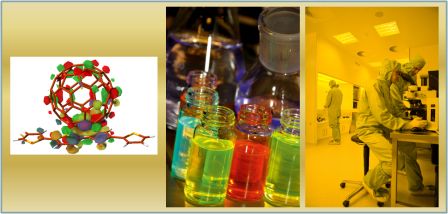EUR 5 million for highly efficient plastic solar cell research
FOM, the Dutch Foundation for Fundamental Research on Matter, has awarded EUR 5 million to set up a focus group for solar cell research, located at the the Zernike Institute for Advanced Materials, a top research institute at the Groningen Faculty of Science and Engineering (formerly known as the Faculty of Mathematics and Natural Sciences). The research should result in ‘plastic’ solar cells ready for large-scale production and application in 2020.
The FOM focus group is headed by Prof. Kees Hummelen, who has been working for years on the development of plastic solar cells. The Faculty of Science and Engineering and the Board of University support the focus group with an extra EUR 1 million in the form of four PhD positions and the organization of five international conferences on the theme.
Developing new materials
The theme of the focus group is ‘Next-generation organic photovoltaics’. A multidisciplinary team of physicists and chemists from the Zernike Institute for Advanced Materials is going to spend the next ten years researching ‘plastic’ solar cells that will be ready in 2020 for large-scale application in economical, sustainable electricity generation. This ambition involves dramatic improvements in the yield, lifespan and cost price of the solar cells as well as in the sustainability of the materials and processes involved.
One of the emphases will be on the development of a completely new generation of molecular semiconductors to bridge the gap between the current organic semiconductors and the ‘classic’ inorganic semiconductors. If that works, spectacular new electronic materials will be created that could be of vital importance outside the field of solar energy as well. The focus group will work closely with Dutch knowledge institutions and industrial partners to prepare for large-scale production and application.

New fundamental energy research
A FOM focus group is a scientific research group that works within a multidisciplinary research theme on one tightly outlined scientific goal under the powerful leadership of a renowned researcher. For a period of about ten years, the focus group is provided with substantial financial resources by FOM to set up its own scientific programme, install senior researchers and purchase equipment. By setting up FOM focus groups at Dutch universities and research institutes, FOM wants to give existing (fundamental) energy research a substantial enriching boost in the coming years. By facilitating new high quality research via focus groups, FOM intends to strengthen the Dutch position in international energy research.
Selected from seven institutions
Seven different universities and research institutes responded to the FOM call for proposals to set up a focus group for fundamental energy research at their institution. In addition to the Groningen proposal, FOM also honoured a proposal by the FOM institute AMOLF with the theme ‘Light management in new photovoltaic materials’. That focus group will be based at the FOM Institute AMOLF in Amsterdam.
More information
Prof. Kees Hummelen, j.c.hummelen rug.nl
On FOM and energy research: http://www.fom.nl/live/english/home.pag
More news
-
19 December 2025
Mariano Méndez receives Argentine RAÍCES award
-
18 December 2025
Why innovate, and for whom?
-
17 December 2025
Ben Feringa wins Feynman Prize
